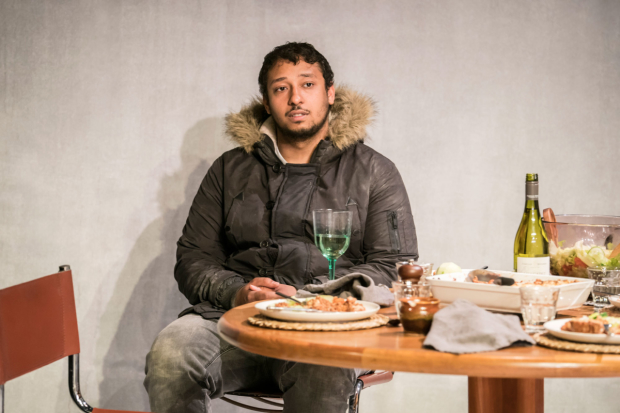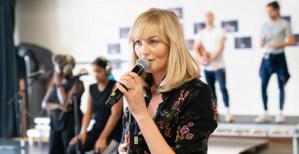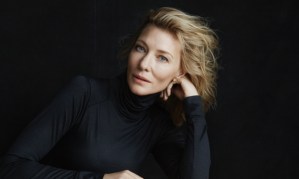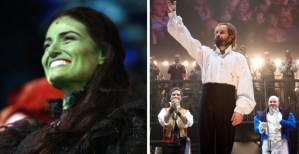Review: One For Sorrow (Royal Court)
Cordelia Lynn’s new play is part comedy of manners, part psychological horror

© Johan Persson
Sirens spiral through the streets outside. Helicopters buzzsaw overhead. The babble of breaking news bleeds in from the next room. As a major terrorist attack unfolds in London – bombs, hostages, a huge police siege – Imogen offers sanctuary on social media: #OpenDoor. Her parents are aghast. Anyone could rock up at their well-to-do home.
Enter John: a brown man with a backpack and an engineering degree, covered in dust, rigid with shock. He won't take his coat off, he won't have a drink. He's different to this white, well-off family – and he's the same: an educated, on-edge Londoner. His difference disarms them. Pearl Chanda's idealistic Imogen is dumbstruck as a virtual gesture becomes real, while her uptight parents, Emma and Bill (Sarah Woodward and Neil Dudgen) don't know what to do with themselves or their guest. Their youngest, teenage daughter Chloe (RADA student Kitty Archer makes a superb stage debut) is exhilarated by it all – by John, by real history, by the rising death count – even though her cousin is caught up in its midst.
Cordelia Lynn's play – part comedy of manners, part psychological horror – uses an uninvited guest to great effect. If John's otherness makes him unknown, the family's guarded hospitality slides to suspicion and hostility. Effectively, One For Sorrow offers a microcosm of the refugee crisis boiling over across Europe: an international issue on a domestic scale, the humanitarian made personal. It asks what those that have owe those that need help, and watches as privilege morphs into protectionism.
Lynn wrings the pettiness of the petty bourgeois for an uneasy comedy – Emma and Bill insist they're "good people" throughout. But her play's a scathing illustration of liberal hypocrisy and prejudice and, as in Roland Schimmelpfennig's Winter Solstice, a stranger's presence reveals their deepest fears and darkest sides.
It's also a pin-sharp analysis of a stark generational divide: trad baby-boomers versus woke millennials. Mum and dad, wine glasses in hand, are more conservative than they'd care to admit; their Blitz mentality battens the hatches. Their kids, meanwhile – heads in their phones – have had their horizons expanded by information online, social media filling in what syllabuses left out. Imogen rejects their values in full – neoliberalism built on neo-colonialism – but it's a kind of self-hatred. If, as she believes, we reap what we sow, she's caught between making amends and somehow annihilating herself. Chanda unravels into catatonic uncertainty brilliantly: her eyes race side-to-side, cogs whirring like a computer crashing.
Should she trust John or not? Should we? Irfan Shamji's inscrutable and sympathetic throughout, but One For Sorrow's better at begging the question than sustaining a plot. Ultimately, it's menace runs out of steam and there's something uncomfortable about a play that guilt trips us for questioning his innocence (brown man with backpack ≠ terrorist) while deploying red herrings that suggest he could be the bomber. Lynn risks exacerbating the very stereotype she wants to confound.
Even so, the young playwright looks like the real deal. As in her debut, Lela and Co, she deploys a slippery ambiguity that makes everything uncertain – and all the more unsettling. Writing with the stilted style as Martin Crimp or Caryl Churchill – too self-conscious for its naturalistic setting – the play undermines its own reality. Is this happening, you wonder. Is it happening here? Or merely metaphor?
James Macdonald's staging makes the most of that uneasiness, and it's tense as a tightrope indoors as violence erupts outside. Guy Hoare's lighting flickers and glitches and ink inches down the walls of Laura Hopkin's bouji flat, as the darkness outside makes its way in.


















